The Surprising Things You Notice, Based On Your Personality Type
The ENFP
You easily spot patterns and connections that other people fail to notice. When you look around you, there’s a sense that everything is connected and part of a bigger picture. What does the tree have in common with the car on the side of the road? How is a fork like a piano? When you see a crowded room full of people you may instantly spot which people are uncomfortable, which ones are faking a connection and which ones secretly have crushes on each other.
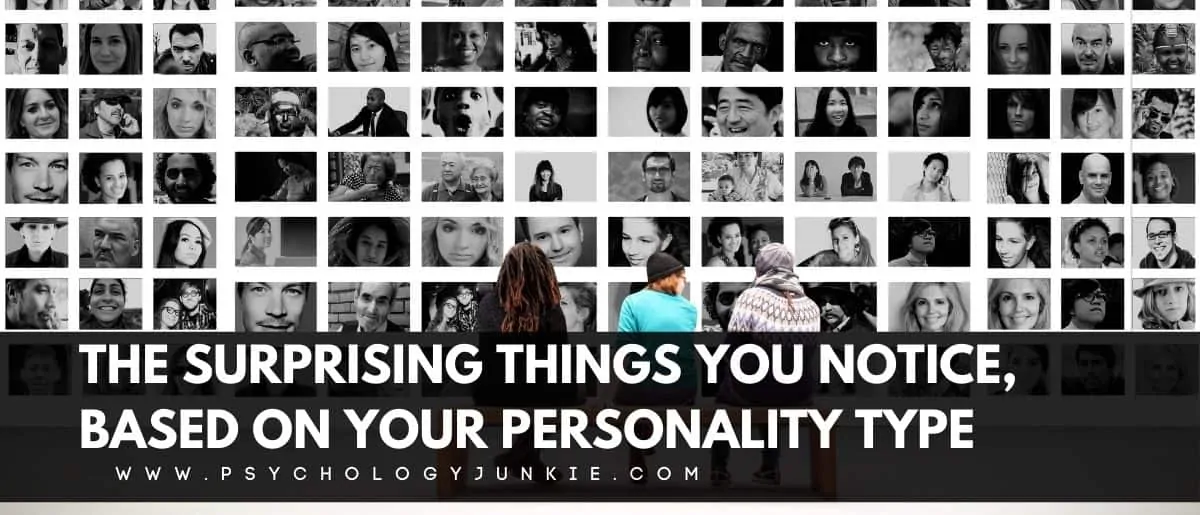
Read This Next: 3 Weird and Wonderful Secrets of the ENFP Personality Type
The ENTP
Like the ENFP, you also notice patterns and connections that seem random or odd to other types. You also notice how things are organized and categorized. For example, when you were young you probably looked in the mirror and tried to figure out why everything that was on your right was on the left-hand side in the mirror, and vice versa. When you play a game, you notice the underlying structure of the game or the underlying framework of someone’s argument or position on a subject.
The INFP
You have a unique ability to assess the priorities and ethics of other people. You notice what’s important to people, what they value, and whether or not they’re acting in a way that is in line with those values. Because of this, you have a skill at creating safe spaces for people to feel comfortable in their own skin. For example, you might notice that a friend of yours has deeply-held religious beliefs that they rarely talk about. When someone else starts making fun of religion or putting it down in some way, you would be the person to pull your friend aside and get them to a place where they don’t feel attacked or ridiculed. Other people might not have noticed that your friend was religious or feeling uncomfortable in the first place.
Read This Next: 12 Fictional Characters You’ll Relate to if You’re an INFP
The INTP
You can almost immediately spot assumptions, biases, and inconsistencies in arguments, beliefs, or rules. When people around you are arguing, you will quickly sense the framework that each person is using to attack the other person. You can also sense faulty logic in both arguments, which components of the argument don’t match up with another, and which categories in the argument are being purposefully ignored. You can quickly call out inconsistencies, inaccurate projections, and hypocrisy without feeling an emotional tie to either side.
Read This Next: 12 Fictional Characters You’ll Relate to if You’re an INTP
The ENFJ
You can quickly spot hidden potential in other people. You seem to know how to influence them and light the spark of that inspiration and turn it into a fire. On top of that, you also notice the cultural values and social expectations in a given sphere. For example, while some types go to a new country and need a lot of time to acclimate to the social customs, you rapidly assimilate the social customs and notice various rules, mannerisms, and ways of speaking that other people are using. Being quick to notice social customs and manners helps you to blend in anywhere you go and respect the shared values of the people around you.
Read This Next: A Look Inside the ENFJ Mind
The ENTJ
You use “if, then” logic to identify strategies and consequences faster than many other types. When you want something, you can quickly create and implement a list of steps to take to get it. It bothers you when people complain about not getting what they want when you can easily see the actions they need to take to get that very thing. From guessing stock market trends to understanding what will make you happy at the end of your life, you have a big-picture vision and a strategic mindset that allows you to organize your life effectively.
Read This Next: 10 Things You’ll Relate to if You’re an ENTJ
The INFJ
Life to you is like a prism of light that is always changing and evolving. You see various contours and angles and how those angles completely alter the experience of each individual. When you experience something, you notice the core “why” at the foundation of the experience. Then you get into the various perspectives surrounding that thing. For example, if someone is telling you a story about their day, rather than focusing on the literal details of the story, you’ll be decoding why they’re telling the story in the first place. Is it to impress someone? Distract from underlying pain? Use up time so that they don’t have to think? You’ll also consider the various perspectives of the people around you and how each person will receive the story differently. Your ability to see all these different perspectives and underlying meanings can make you shockingly insightful.
Read This Next: 24 Signs That You’re an INFJ, the “Mystic” Personality Type
The INTJ
Like the INFJ, you also see various perspectives and underlying meanings in the world around you. Because you have Extroverted Thinking paired with your Intuition, you also see implementable strategies at every turn. It’s easy for you to imagine life as a complex strategy game, and you often feel like the only one who knows the ultimate strategy and sees the big picture. You spot implications, outcomes, and opportunities quickly and can alter your life plan at a moment’s notice so that it lines up with your long-term goals.
Read This Next: 24 Signs That You’re an INTJ, the “Strategist” Personality Type
The ESFP
You can “read” people with shocking accuracy because you’re literally a master of decoding body language and physical movements. You have such high-definition focus on the world around you that you’ll be the first to notice if someone’s lying, sucking up, manipulating, or has ulterior motives. You notice changes in skin color, breathing rate, and even pupil dilations sometimes. Being so attentive and uncannily observant can make you quick to spot unsaid feelings in other people.
Read This Next: What It Means to be an ESFP Personality Type
The ESTP
You quickly spot immediate resources that can be used to solve a problem or amp up an experience. If you’ve ever watched Sydney Bristow in the “Alias” TV show, she gives an excellent example of this. She can fight people by creatively using any object in her immediate vicinity (like a car antennae or even a refrigerator door). Like Bristow, your ability to instantly spot how something can be used makes you a formidable physical opponent and also a skilled opportunist.
The ISFP
You can rapidly assimilate yourself into someone’s emotional experience, or “get into their shoes” and understand how they might be feeling. You also have a nuanced understanding of emotions, so you’ll be able to tell the difference between whether someone is “sad” or “disillusioned,” “happy” or “hopeful.” Emotions that other types see in general, blurry terms, you see in high-definition detail.
Read This Next: 24 Signs That You’re an ISFP, the “Virtuoso” Personality Type
The ISTP
You spot logical fallacies more frequently and rapidly than most types and, as a result, can be challenging to convince of anything without pure, unadulterated facts. You quickly realize when people are defending their decisions by using false dichotomies, straw man arguments, or half-truths. You have little patience for this and can quickly tune people out who are trying to manipulate you in this way. You just don’t see it as worth your time.
Read This Next: In-Depth ISTP Profile
The ESFJ
You quickly spot the nuanced details of how people interact with each other. Because you’re so attuned to interpersonal dynamics you notice when there are unsaid tensions between people, when there is chemistry, or when certain people would get along if they were just introduced. Because of this skill, you have a knack for bringing people together, diffusing conflicts, and seeing potential partnerships.
The ESTJ
You instantly see inefficiencies and incompetencies in your environment. But you don’t just go around correcting every little thing that’s wrong in the world. You prioritize what you’ll focus on in order from most important to least. You’ll focus on first-priority issues before trying to address second-priority problems. You like life to run like a well-oiled machine and you’re skilled at resolving problems that are slowing things down or causing unneeded chaos.
The ISFJ
You see life through a series of filters and lenses that compare what’s happening now to the experiences in your past. Because of this, you can spot changes very quickly. As an example, you’re probably the first to notice when someone has cut their hair, changed the décor in their living room, or even appears more uncomfortable physically. Because of your ability to spot these changes, you can often pick up on physical cues about how people feel and what they need. You can also recall solutions from the past that can be used to optimize a current situation.
Read This Next: 24 Signs That You’re an ISFJ, the Protector Personality Type
The ISTJ
You have an intense attention to detail that few can rival. You don’t just see the obvious details on the surface, though. Seeing something in the present can trigger a series of other images and memories from the past in your mind. You probably experience déjà vu a lot because you’re so connected to these previous experiences. You know how to use your rich mental storehouse of facts to make the current moment more efficient or enjoyable.
Read This Next: 24 Signs That You’re an ISTJ, the Detective Personality Type
What Are Your Thoughts?
Did you enjoy this article? Do you have any thoughts or experiences to share! Let us know in the comments!
Find out more about your personality type in our eBooks, Discovering You: Unlocking the Power of Personality Type, The INFJ – Understanding the Mystic, The INFP – Understanding the Dreamer, and The INTJ – Understanding the Strategist. You can also connect with me via Facebook, Instagram, or Twitter!
Subscribe to Our Newsletter

Want to discover more about personality type? Get the inside scoop with Susan Storm on all things typological, along with special subscriber freebies, and discounts on new eBooks and courses! Join our newsletter today!


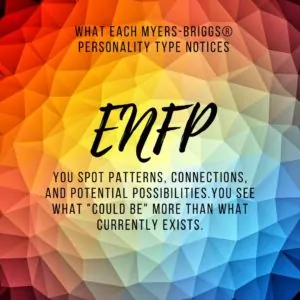
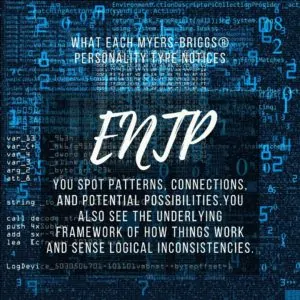
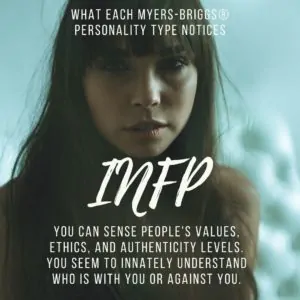
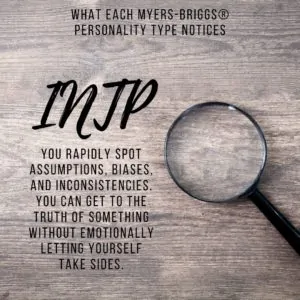
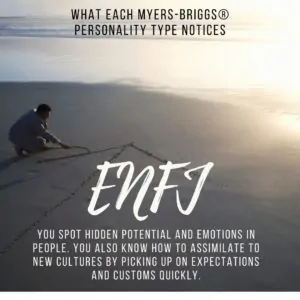
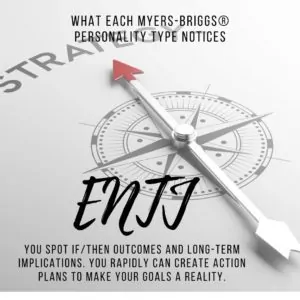
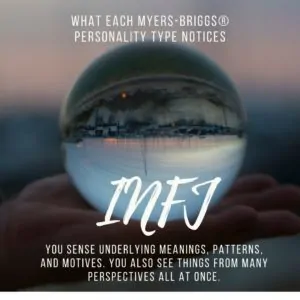
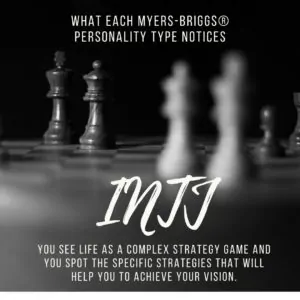
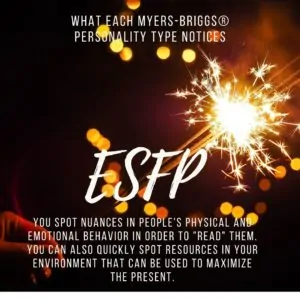
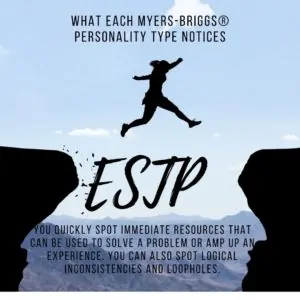
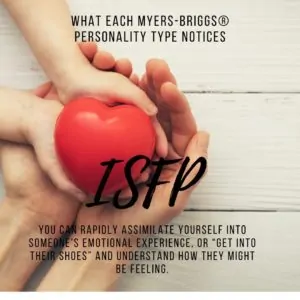
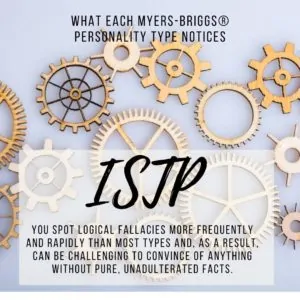
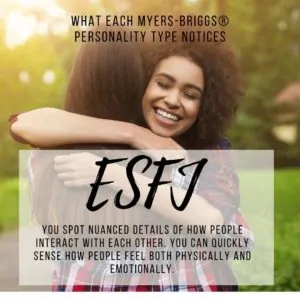
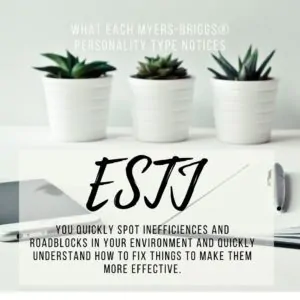
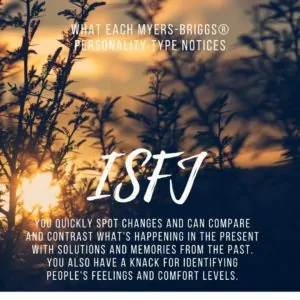
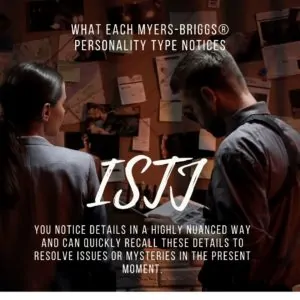







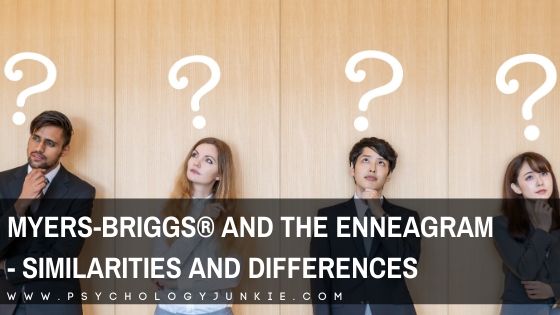

I’m an ENFP and have no idea how a fork is like a piano. XD
LOL!!! 🙂
“You can almost immediately spot assumptions, biases, and inconsistencies in arguments, beliefs, or rules.” Soooo true.. x) If you lie to me, be sure the story checks out. One mistake and the lie is over.
“When people around you are arguing, you will quickly sense the framework that each person is using to attack the other person. You can also sense faulty logic in both arguments, which components of the argument don’t match up with another, and which categories in the argument are being purposefully ignored.” That’s very true. Sadly others have a hard time understanding it, even when I point it out, and it’s highly frustrating.
“You can quickly call out inconsistencies, inaccurate projections, and hypocrisy without feeling an emotional tie to either side.” Mmmmh yes but I do find it annoying quite often, actually.. I think the inaccuracy annoys me..
According to this, ISTPs are more insightful to people’s manipulations than INTPs are, which I see is true. Se is actually a useful indicator of observing the detail of people’s body language that is present, even without the Fi. The skill is more associated with ESTPs than ISTPs between the both of them, but still. If anything, the best thing I often unintentionally do around manipulation is not notice someone has been manipulating me, and then irritating them at the end because indirectly guilting me doesn’t really affect my decisions much. Why do manipulators think just because someone is quiet, they are that type of person? Being an extrovert doesn’t make you more assertive, and being an introvert doesn’t make you more passive. Oh well. I guess it’s my chance to show them that I knew about what they’ve been doing all along, but I have been ignoring their hints to screw with them. Yeah. Great idea.